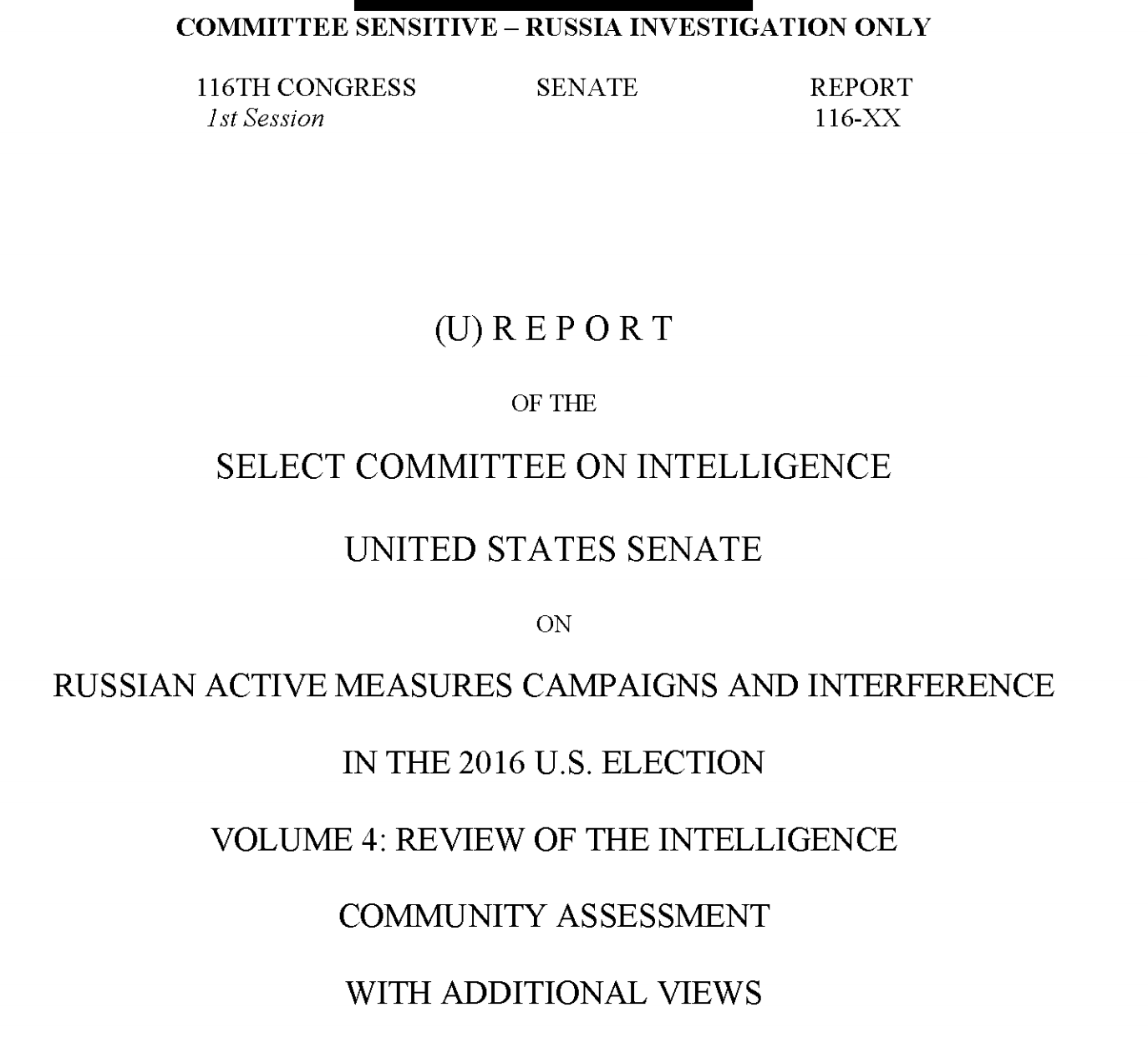
On April 21, 2020, the U.S. Senate Intelligence Committee published the fourth and penultimate volume of an extensive report on Russian Active Measures Campaigns and Interference in the 2016 U.S. Election. Volume 4 is titled “Review of the Intelligence Community Assessment.” It examines the 2017 Intelligence Committee Assessment (ICA) that determined that Russia interfered with the 2016 U.S. election. The Committee examined the sources and work behind creating the ICA, amidst the controversy over the U.S. intelligence investigation raised by the Trump Administration, which claimed it was politically motivated against him. The Senate Intelligence Committee report repudiates that notioin. In accordance with protecting the identities of the sources behind the ICA, much of the 157-page report has been redacted. The report unanimously concludes that the findings in the 2017 ICA back up the suspected aggressive propaganda campaign and interference conducted by Russia in the 2016 U.S. election.
Volume 4's unredacted factual background and the key findings of the examination of the ICA provide a clear view of the Committee's finding. The Committee's examination of the ICA was conducted by reviewing source documents along with interviews with officials involved in preparing the assessment. In reviewing the ICA, the Senate Intelligence Committee Chairman Richard Burr (R-NC) stated the committee looked at two key issues: (1) whether the final product of the ICA met the task assigned by the President; and (2) if the analysis was backed by the intelligence provided in the ICA. Burr concluded that the analysis and conclusion in the ICA were strong. No reason could be found to dispute the findings by the Intelligence Community. In a statement, Chairman Burr concluded: "The I.C.A. reflects strong tradecraft, sound analytical reasoning and proper justification of disagreement in the one analytical line where it occurred. The committee found no reason to dispute the intelligence community’s conclusions.”
The warnings of continued Russian interference and also the vigilance needed due to continued interference for the 2020 election were reaffirmed in the ICA. Russia sought to interfere with the 2016 election to harm the candidacy of Secretary HIllary Clinton and to help elect then-candidate Donald Trump. The Russian interference did not stop after the 2016 election. Russia has continued to interfere with American democracy and the extent of the aggressive attacks as noted in ICA is not exaggerated, the Senate report determined. Both Chairman Burr and Vice Chairman Mark Warner (D-VA) concluded there is no doubt that Russia will once again interfere in the 2020 election as they did in 2016.
While much of the report is redacted, the key findings validate the 2017 ICA:
- The ICA met the task assigned by the President; providing a bipartisan analysis of the Russian interference. None of the individuals involved in the drafting of the ICA were biased to reach specified conclusions by a particular political party, because of this the ICA provided an accurate reporting of the Russian interference during the 2016 election.
- The aggressive and unprecedented nature of Russia’s interference on the 2016 election is well documented in the ICA. The reporting does not far exceed its reach, with regards to warning policy makers of Russia’s role.
- It is important to note that within the ICA no policy recommendation was made in regard to combatting future Russian interference. While it is all but assured that Russia will again interfere in 2020, no recommendations are given. The lack of policy suggestion is intentional. The intelligence committee themselves do not make any policy, they are simply set aside to provide detailed analysis and warnings to those in place to lawfully create policy.
- It is noteworthy that the ICA does not include much information about any attempt that Russia made to interfere with the election in 2008 and 2012. Instead making it clear the actions in 2016 were unprecedented.
The Committee did find that the ICA fell short in certain areas. While the ICA provided a comprehensive insight about 2016 and warnings about Russia’s continued interference, they did not delve into Russian propaganda through state-owned media platforms. The lack of insight into media networks such of RT’s coverage on the leaks from Wikileaks’ containing information about the Democratic National Committee would have aided in further substantiating the full brevity of the Russian propaganda.
Volume 4 further substantiates the need for greater steps to stop Russian interference in the U.S. election. A fifth and final volume is expected by the Committee as part of its report on the Russian interference on the election.
-written by Bisola Oni